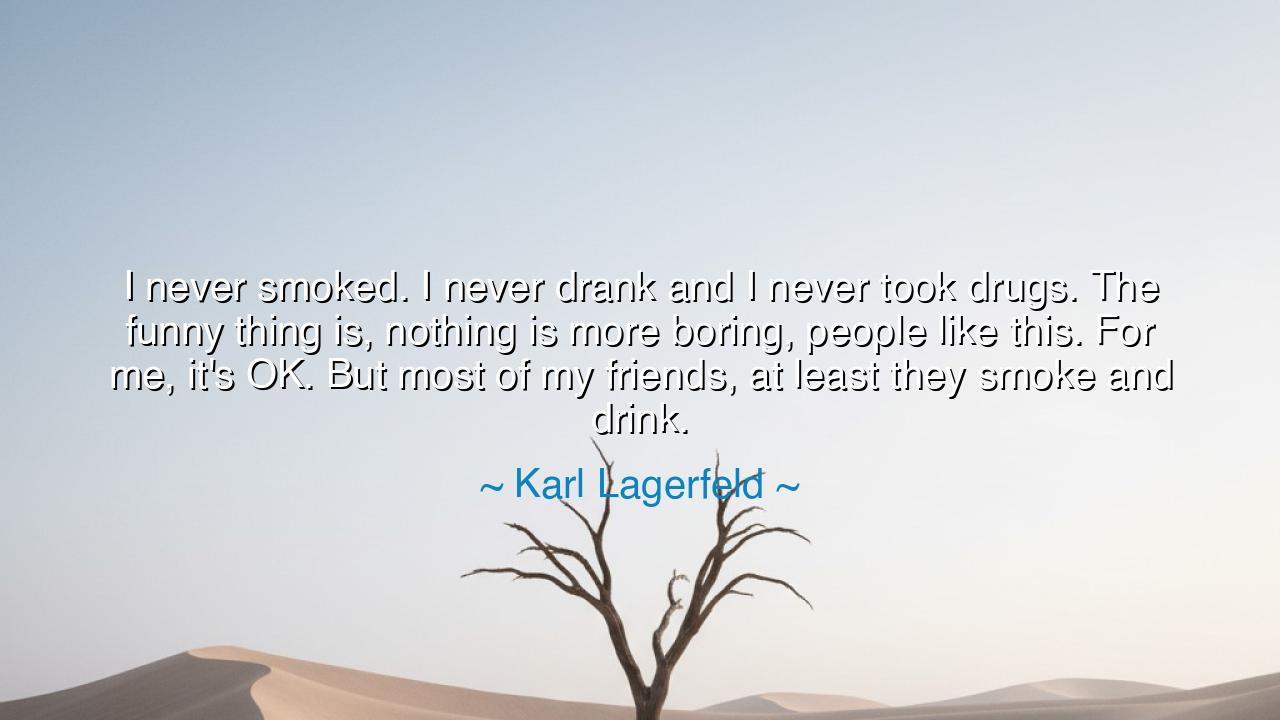
I never smoked. I never drank and I never took drugs. The funny
I never smoked. I never drank and I never took drugs. The funny thing is, nothing is more boring, people like this. For me, it's OK. But most of my friends, at least they smoke and drink.






“I never smoked. I never drank and I never took drugs. The funny thing is, nothing is more boring, people like this. For me, it's OK. But most of my friends, at least they smoke and drink.” — Karl Lagerfeld
In these words, Karl Lagerfeld, the architect of elegance and one of fashion’s most disciplined minds, speaks not only of his personal habits, but of the strange paradox of virtue in the modern world. He reveals a truth the ancients also knew — that discipline is often mistaken for dullness, and self-control for sterility. To abstain from indulgence is to live in contrast to a culture that worships excess. His words are laced with irony and wisdom: he laughs at the notion that people like him — clean, temperate, restrained — are thought to be boring, while indulgence is seen as a mark of passion or creativity. And yet, he accepts this view with serenity, for his joy was not in pleasing others, but in mastering himself.
The ancients, too, revered such self-mastery. The Stoics of Greece and Rome — Epictetus, Seneca, and Marcus Aurelius — taught that freedom lies not in doing as one pleases, but in not being enslaved by pleasure. “He who conquers himself,” they said, “is mightier than he who conquers a city.” In this sense, Lagerfeld’s abstinence was not repression but victory. By refusing to be ruled by smoke, drink, or intoxication, he claimed sovereignty over his own will. And yet, he recognized the irony of the age: that those who live freely from addiction are seen as uninteresting, while those enslaved to their passions are romanticized as daring or alive. Virtue, once admired, has become misunderstood.
Consider the story of Socrates, the philosopher who walked barefoot through Athens, untempted by luxury or excess. His students marveled at how little he needed, how calm he remained while others chased pleasure. Yet even in his time, some mocked him as strange — too detached, too dull, too sober. But it was that very sobriety that allowed his mind to soar unclouded. Like Lagerfeld, he understood that true clarity demands restraint, and that those who live with temperance see the world as it is, not as it appears through the fog of indulgence. The wise man does not reject pleasure because he despises joy — he rejects enslavement because he treasures freedom.
There is also a subtle melancholy in Lagerfeld’s words. When he says, “Most of my friends, at least they smoke and drink,” he speaks not with judgment, but with an almost wistful amusement — as though aware that his detachment separates him from others. It is the loneliness of the disciplined soul, one who walks a path too narrow for the crowd. The ancients called this the price of wisdom: to live differently is to live apart. Yet Lagerfeld’s calm acceptance — “For me, it’s OK” — reflects the peace of one who no longer seeks validation. He found contentment in his own rhythm, and that, perhaps, is the purest form of art.
The deeper meaning of his statement lies in this: what the world calls boring may, in truth, be balance. In an age that glorifies chaos, the stillness of a centered spirit can seem foreign. But it is from that stillness that clarity, focus, and creativity arise. Lagerfeld, known for his relentless work ethic and endless reinvention, proved that moderation need not mean mediocrity. Like the disciplined monks of old who illuminated manuscripts while the world raged outside, he created beauty from order, elegance from restraint. His refusal of indulgence was not a denial of life, but a celebration of purpose.
Let us, then, draw from his wisdom a lesson of both humility and strength. Do not mistake excess for brilliance, nor simplicity for dullness. The fire that burns slow and steady endures longer than the one that consumes itself in a single blaze. It is better to live with mastery over desire than to be mastered by it. Restraint is not the enemy of joy — it is the guardian of it. The disciplined heart tastes life more fully, because it is not numb from indulgence nor blinded by craving.
So, my child, take this teaching and carry it into your own life. In a world that celebrates the loud, dare to be quiet. In a time that praises the reckless, dare to be deliberate. You need not smoke, drink, or drown in pleasure to be alive. To live with purpose, to create with focus, to laugh with a clear mind — these are the joys that do not fade. Remember Karl Lagerfeld’s words and the laughter behind them: that what the world finds boring may, in truth, be brilliance disguised as peace. And when others chase pleasure, may you choose freedom — for from freedom, all beauty flows.






AAdministratorAdministrator
Welcome, honored guests. Please leave a comment, we will respond soon